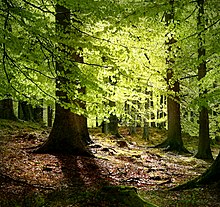лѣсъ
Jump to navigation
Jump to search
Old Church Slavonic[edit]

Etymology[edit]
From Proto-Slavic *lěsъ.
Noun[edit]
лѣсъ • (lěsŭ) m
- forest
- woods
- from the Homily against the Bogumils, 1794-1796:
- бо би велѣлъ богъ не дѣлати чловѣкомъ то бꙑлиѥ жито би раждало и лѣсъ грозниѥ.
- bo bi velělŭ bogŭ ne dělati člověkomŭ to bylije žito bi raždalo i lěsŭ groznije.
- If God had ordered men not to work, plants would grow grain and woods grapes.
- from Vita Methodii, 0700210:
- и азъ на лѣсѣ надаю, своі дьнь съконьчавъ.
- i azŭ na lěsě nadaju, svoi dĭnĭ sŭkonĭčavŭ.
- Now my days are ending and I am waiting for the woods.
- from the Homily against the Bogumils, 1794-1796:
Old East Slavic[edit]


Etymology[edit]
From Proto-Slavic *lě̑sъ. Cognates include Old Church Slavonic лѣсъ (lěsŭ) and Old Polish las.
Pronunciation[edit]
- (ca. 9th CE) IPA(key): /ˈleːsʊ/
- (ca. 11th CE) IPA(key): /ˈlʲeːsʊ/
- (ca. 13th CE) IPA(key): /ˈlʲɛːs/, /ˈlʲeːs/
- Hyphenation: лѣ‧съ
Noun[edit]
лѣсъ (lěsŭ) m (diminutive лѣсъкъ or лѣсьць, related adjective лѣсьнъ)
Declension[edit]
Declension of лѣсъ (hard o-stem)
Descendants[edit]
References[edit]
- Sreznevsky, Izmail I. (1902) “лѣсъ”, in Матеріалы для Словаря древне-русскаго языка по письменнымъ памятникамъ [Materials for the Dictionary of the Old East Slavic Language Based on Written Monuments][1] (in Russian), volumes 2 (Л – П), Saint Petersburg: Department of Russian Language and Literature of the Imperial Academy of Sciences, column 76
Russian[edit]
Noun[edit]
лѣсъ • (lěs) m inan (genitive лѣ́са, nominative plural лѣса́, genitive plural лѣсо́въ)
- Pre-1918 spelling of лес (les).
Declension[edit]
Pre-reform declension of лѣсъ (inan masc-form hard-stem accent-c irreg)
Categories:
- Old Church Slavonic terms inherited from Proto-Slavic
- Old Church Slavonic terms derived from Proto-Slavic
- Old Church Slavonic lemmas
- Old Church Slavonic nouns
- Old Church Slavonic masculine nouns
- Old Church Slavonic terms with quotations
- cu:Nature
- Old East Slavic terms inherited from Proto-Slavic
- Old East Slavic terms derived from Proto-Slavic
- Old East Slavic terms with IPA pronunciation
- Old East Slavic lemmas
- Old East Slavic nouns
- Old East Slavic masculine nouns
- Old East Slavic hard masculine o-stem nouns
- Russian lemmas
- Russian nouns
- Russian terms spelled with Ѣ
- Russian masculine nouns
- Russian inanimate nouns
- Russian obsolete forms
- Russian pre-1918 spellings
- Russian hard-stem masculine-form nouns
- Russian hard-stem masculine-form accent-c nouns
- Russian nouns with accent pattern c
- Russian nouns ending in a consonant with plural -а
- Russian irregular nouns
- Russian nouns with irregular nominative plural
- Russian nouns with locative singular